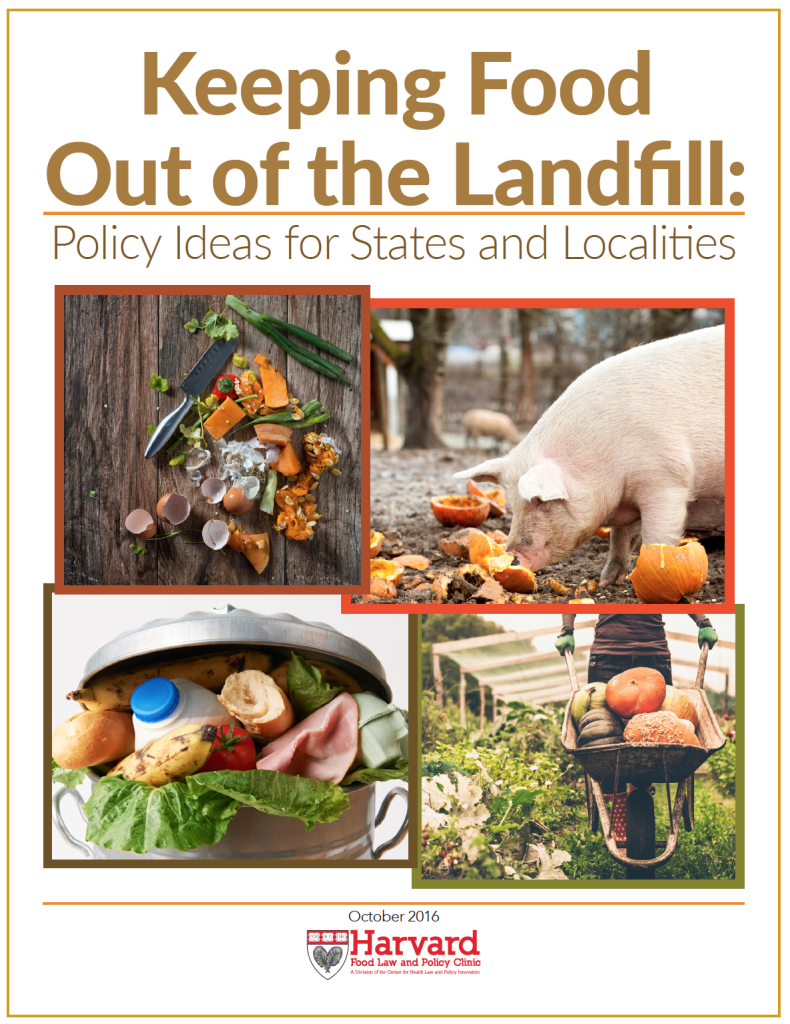 Today the Harvard Law School Food Law and Policy Clinic (FLPC) releases Keeping Food Out of the Landfill: Policy Ideas for States and Localities. This toolkit provides comprehensive information on eight different policy areas that states and localities can consider as they ramp up efforts to reduce food waste. There are great opportunities for food waste reduction at the federal level, but much can be done by states and localities, whose involvement in finding solutions to food waste and food recovery is vital. The toolkit includes recommendations for each of the policy areas, which can be utilized by legislators, advocates, food donors, and food recovery organizations to call for policy changes. Each section of the toolkit describes the relevant federal laws, provides state examples, and offers the Clinic’s policy recommendations. The policy areas addressed in Keeping Food Out of Landfills are:
Today the Harvard Law School Food Law and Policy Clinic (FLPC) releases Keeping Food Out of the Landfill: Policy Ideas for States and Localities. This toolkit provides comprehensive information on eight different policy areas that states and localities can consider as they ramp up efforts to reduce food waste. There are great opportunities for food waste reduction at the federal level, but much can be done by states and localities, whose involvement in finding solutions to food waste and food recovery is vital. The toolkit includes recommendations for each of the policy areas, which can be utilized by legislators, advocates, food donors, and food recovery organizations to call for policy changes. Each section of the toolkit describes the relevant federal laws, provides state examples, and offers the Clinic’s policy recommendations. The policy areas addressed in Keeping Food Out of Landfills are:
- Liability Protection for Food Donations;
- Tax Incentives for Food Donations;
- Date Labeling;
- Food Safety for Food Donations;
- Food Waste Reduction in K-12 Schools;
- Feeding Food Scraps to Livestock;
- Organic Waste Bans and Waste Recycling Laws; and
- Government Support for Food Waste Reduction.
Keeping Food Out of Landfills covers a range of exciting policy examples from all over the country, such as Virginia’s new tax incentive for food donors, California’s funding to support food recovery infrastructure, guidance by Indiana to help schools implement share tables and reduce food waste, and organic waste bans and waste recycling laws from New York City to Vermont. A variety of educational resources are included in the toolkit to encourage readers to expand their knowledge of ways to address food waste.
The toolkit comes at the end of a year focused on food waste reduction for FLPC. In June, the Clinic co-hosted the Reduce and Recover: Save Food for People conference on food waste reduction with the EPA and MassDEP. “EXPIRED? Food Waste in America,” a documentary from FLPC and Racing Horse Productions on date labels and their contribution to food waste was released in February and this month it received an award at the Faces of Hunger Short Film Festival in New York. The Clinic has also published a federal tax incentives legal guide, “Federal Enhanced Tax Deduction for Food Donations,” a two-pager on ways to improve the federal Emerson Act, “Recommendations to Strengthen The Bill Emerson Good Samaritan Act,” and a report on the laws surrounding using food scraps for animal feed, “Leftovers for Livestock: A Legal Guide for Using Excess Food as Animal Feed.”
Approximately 40% of the food produced in the U.S. is wasted annually. At a time when millions of Americans are food insecure and thousands of farmers struggle to stay afloat, the negative consequences of wasting food extend far beyond the environmental impacts and loss of resources that could have been otherwise allocated. FLPC hopes this toolkit will serve as a guide to creating systemic change that redirects food from the landfill to those who need it most.
Read Keeping Food Out of the Landfill: Policy Ideas for States and Localities.


Health Law & Policy, Commentary
Braidwood Management v. Becerra: Updated FAQs for Health Advocates and Providers
July 22, 2024